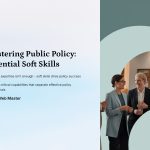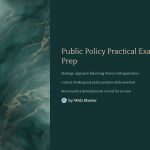 Embarking on the journey to enroll in a graduate school for public policy is a significant step toward a career dedicated to societal improvement and governance. This comprehensive guide aims to provide you with essential insights and strategies to navigate the preparation process effectively.
Embarking on the journey to enroll in a graduate school for public policy is a significant step toward a career dedicated to societal improvement and governance. This comprehensive guide aims to provide you with essential insights and strategies to navigate the preparation process effectively.

Understanding the Role of Public Policy Education
Pursuing a graduate degree in public policy equips individuals with the analytical tools and knowledge necessary to address complex societal issues. This education fosters critical thinking, policy analysis, and leadership skills, preparing graduates to influence and implement effective policies across various sectors.

Assessing Your Motivation and Career Goals
Before applying, it’s crucial to reflect on your motivations for pursuing this path. Are you driven by a desire to effect change in public administration, non-profit sectors, or international organizations? Clarifying your career objectives will guide your program selection and application strategy.

Researching Potential Programs
Investigate various institutions offering public policy graduate programs. Consider factors such as curriculum strength, faculty expertise, alumni networks, and specialization areas. Resources like the NASPAA provide accredited program listings and valuable insights.

Meeting Admission Requirements
Admission criteria typically include:
- Academic Background: A bachelor’s degree with a strong academic record.
- Standardized Tests: GRE scores are commonly required; however, some programs may waive this requirement.
- Professional Experience: Relevant work experience can enhance your application.
- Letters of Recommendation: Obtain strong endorsements from professionals or academics familiar with your capabilities.
- Personal Statement: Articulate your passion for public policy and how the program aligns with your goals.

Strengthening Your Application
To build a compelling application:
- Gain Relevant Experience: Engage in internships, volunteer work, or employment in policy-related fields.
- Develop Quantitative Skills: Proficiency in statistics and economics is advantageous.
- Network: Connect with current students, alumni, and faculty to gain insights and mentorship.

Preparing for Interviews
Some programs may require interviews. Prepare by:
- Understanding Current Events: Stay informed about global and domestic policy issues.
- Practicing Communication Skills: Clearly articulate your thoughts and demonstrate critical thinking.
- Reflecting on Experiences: Be ready to discuss how your background has prepared you for a career in public policy.
*Capturing unauthorized images is prohibited*






